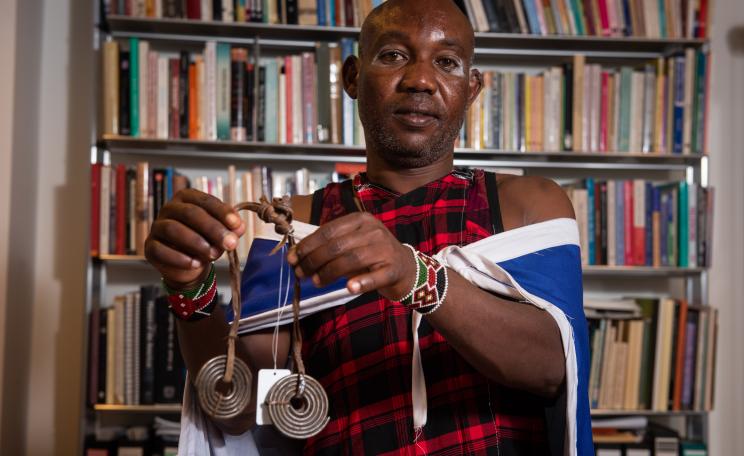-
A gathering of 40 Indigenous activists and video practitioners assembled in South Africa last month to discuss the global human and environmental crises and how we might solve them.
Activists came from all corners of Africa to meet and learn from other Indigenous peoples who are facing the same challenges across the continent. They took new skills home to their communities – in particular ways to use video to defend their territories, preserve and protect their cultures and amplify their voices.
Despite coming from different countries and communities, the Indigenous activists echoed concerns for their endangered cultures and threatened land.
Living cultures
These worries united the Indigenous activists in attendance. Samwel Nangiria, a Maasai activist and InsightShare-trained video practitioner, said: “All over the world I have seen people crying, “culture is being eroded, culture is dying, traditional systems are dying” and therefore the bond between the land and the people is destroyed.”
These echoes of shared thought came together to form a single voice shouting out for a united effort. This desire for unity and global community was enshrined in the formulation of a Pan-African Living Cultures Alliance (PALCA).
Francis Shomet, a Maasai activist from Tanzania, captured the importance of this moment: “For me, we have no choice, for me this is the most opportune time … PALCA is really timely and it is the only strategy I see right now.”
PALCA is an alliance of InsightShare’s African partners - among them Baka, Gabbra, Maasai, El Molo, Gamo, Pondoland and San communities - who want to harness the power of participatory video to defend their cultures and lands.
Through participatory video, Indigenous communities can create locally-led media that expresses their unique cosmovisions freely and without manipulation or ventriloquism. Ivan Vaalbooi, a member of the /'Aoni N//ng, San community of Southern Kalahari, offered this account: “Participatory video has been a mind-opening discovery, simple in method, yet very powerful. It definitely has a role to play in cultural revival and to help strengthen communities in restoring their identity.”
Empowering communities
Participatory video empowers communities by giving them confidence in their cultural systems and traditional ecological knowledge, and by enabling them to communicate with similar groups.
Global connectivity for Indigenous peoples was much spoken about at the gathering and much celebrated. Magella Hassan, from the El Molo in northern Kenya, pronounced, “Now we are coming together as one community, as one people, as one nation, as one Africa, as one world.”
But it is not just other Indigenous communities the members of PALCA want to reach. There is a desire to work with governments, organisations and movements in the global north too.
There are some struggles in which we are all united and some systems under which we are all oppressed - here we have common cause. One cause that resonated with those at the gathering was the global plight of youth. Magella, a youth activist, said, “The youth are being affected all over the world, not just in my community.”
Concern about the future we leave for young people was tangible. Amos Leuka, a Maasai activist from Kenya, captured this anxiety in a Maasai proverb: the pride and shame of a community lies with the youth.
Leuka explained that without young people having influence "pride will lack meaning, because participation is paramount" - we encounter shame when we do not allow our youth to take positions of leadership and responsibility.
Participatory governance
Samwel confirmed this point: “Youth all over the world are devalued … [they] are worried about their future, because they don’t participate in constructing, in imagining their future … This is why you see youth in Europe and America taking to the streets as rebels. In the context of Africa, Indigenous youth are even further from being able to engage in decision making.”
This leads us to question the role each of us plays in creating true participatory governance. This is not just a matter of achieving influence for ourselves, making sure our own voices are heard; it is also a matter of ensuring that other people’s voices are heard.
This is an increasingly important consideration for movements in the global north, like Extinction Rebellion. What can be learned and applied to strengthen diverse communities, culture and unity within XR?
One way to start is through exchanging video messages. But the next step may be to train local facilitators in participatory video to create a bridge between communities in the UK, to radically improve inclusivity in the movement.
A movement that seeks to address the climate emergency by dismantling the structures that caused it in the first place must make greater efforts to learn from the people who have been marginalised by those systems, and bring them to the forefront of change. Those people include Indigenous peoples, communities of the global south, and the ethnic and economic minorities within our own borders.
Indigenous knowledge
As the gathering came to a close Befetary Demisse, a Gamo Elder from southern Ethiopia issued a stark warning: “Without Indigenous peoples, the world as we know it is gone. Biodiversity and ecological ways of living continue through Indigenous peoples’ cultures.
"Nowadays everyone talks about climate change, even the politicians, the big people, they talk about the end of the world. But politics won’t solve things! The universities, the intellectuals, they must engage with Indigenous knowledge. Our videos must wake people up, knock on all doors!”
I end with words from Francis Shomet and a call to support Indigenous communities and their solutions: “I am calling the whole planet to actually try and understand Indigenous knowledge systems... and how they can inspire us to invent new knowledge, new ways, new mindsets in order to save the planet.”
This Author
Nick Lunch is co-founder and director of InsightShare






